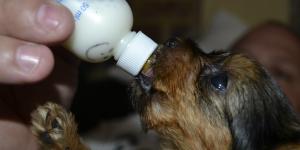What Kind of Food Can I Feed My 1 Month Puppy?



See files for Dogs
During the first few months of life, puppies undergo a remarkable period of rapid growth and development. This critical phase lays the foundation for their future health and well-being. Their bodies are constantly changing and adapting, and they demand a specialized diet to support their nutritional needs. From birth to one month of age, puppies grow at an astonishing rate, gaining up to 20% of their body weight each week. Their bodies are busy developing the essential structures they will need for adulthood, including bones, muscles, organs, and the nervous system.
In the following AnimalWised article, we delve into the dietary considerations for a one-month-old puppy, covering options ranging from homemade to commercial feeds.
Nutritional needs of puppies
Puppies are in a rapid growth and development phase, making their nutritional needs particularly important. In fact, puppies undergo a remarkable transformation during their first few months of life, experiencing an astonishing rate of growth and development that lays the foundation for their lifelong health and well-being. This rapid growth phase, spanning from birth to about three months of age, is characterized by significant changes in their physical appearance, cognitive abilities, and behavior.
Each nutrient plays a crucial role in supporting their overall well-being, let us take a closer look:
- Proteins: proteins are the building blocks of tissues, muscles, organs, and enzymes. They are essential for growth, repair, and immune system function.
- Fats: fats provide energy, support the absorption of fat-soluble vitamins, and play a role in hormone regulation and brain development. Omega-3 fatty acids, particularly EPA and DHA, are especially beneficial for brain and eye health.
- Carbohydrates: Carbohydrates are the primary source of energy for daily activities and provide fiber for digestive health.
- Vitamins and minerals: vitamins and minerals act as catalysts for various bodily processes, including bone development, immune function, and nutrient absorption.
A balanced diet for growing puppies should provide an appropriate ratio of these essential nutrients:
- Protein: 22-25% of total calories
- Fats: 15-20% of total calories
- Carbohydrates: 55-60% of total calories
Weaning puppies
Nursing, also known as suckling or breastfeeding, is the primary source of nutrition for puppies during their first weeks of life. Mothers provide their pups with colostrum, a nutrient-rich milk that contains antibodies and other essential substances that help protect puppies from infections and support their immune system development.
Nursing goes beyond providing nourishment; it's a bonding experience that fosters social development in puppies. As they suckle, puppies form a close connection with their mother and littermates, establishing the foundation for future social interactions.
Weaning is the gradual process of transitioning puppies from solely nursing on their mother's milk to consuming solid food. It is a crucial stage in their development, as it helps them develop their digestive systems and prepare for a wider range of foods as they mature.
Weaning puppies too early, before they have fully developed their digestive systems and immune systems, can deprive them of essential nutrients and antibodies from breast milk. This early transition to solid food may put puppies at increased risk of health problems.
Mothers with health problems, such as mastitis (inflammation of the mammary glands), may be unable to produce sufficient milk to meet the nutritional demands of their puppies. If the mother is unable to care for her puppies, artificial feeding with a commercial puppy milk replacer is necessary. This alternative source of nutrition should be closely monitored by a veterinarian to ensure it meets the puppies' nutritional needs.
When should puppies start eating solid food?
This transition typically begins around four weeks of age, although some puppies may start as early as three weeks or as late as six weeks.
Several signs signal a puppy's readiness to embrace solid food. First, their weight gain, often tripling by four weeks, demonstrates adequate growth and preparedness for the additional nutrients solid food provides. Additionally, the development of deciduous teeth, the precursor to adult teeth, around three to four weeks, equips them with the necessary chewing ability to tackle solid food. Finally, their increasing interest in food, evident in their exploration of their mother's food bowl or nibbling on food left around the house, signifies their curiosity and willingness to explore new flavors and textures.
Worried about nourishing your premature puppy? Discover the essential tips and tricks in our other article.

What should I feed my one-month-old puppy?
Puppies have unique nutritional needs to support their rapid growth and development. Commercial puppy food provides a convenient and balanced diet that meets these needs. There are three main types of commercial puppy food: dry kibble, wet or canned food, and semi-moist food.
- Dry kibble is the most common type of puppy food. It is inexpensive, convenient, and easy to store. Kibble is also a good source of dental health benefits, as it helps to clean the puppy's teeth as they chew. However, kibble is not as palatable as wet or semi-moist food, and some puppies may not be as interested in eating it.
- Wet or canned food is more palatable than dry kibble and is often a good choice for picky eaters. It is also a good source of moisture, which is important for puppies, as they tend to get dehydrated more easily than adults. However, wet or canned food is more expensive and has a shorter shelf life than dry kibble.
- Semi-moist food is a combination of dry kibble and wet food. It is more palatable than dry kibble and has a longer shelf life than wet food. However, semi-moist food is also higher in moisture and protein than dry kibble, and some puppies may experience digestive upset from it.
When selecting commercial puppy food, it is important to read the label carefully and make sure the food meets the puppy's nutritional requirements. The label should list the ingredients in order of their weight, and the first few ingredients should be high-quality protein sources, such as chicken, beef, or lamb. The food should also be high in essential nutrients, such as calcium, phosphorus, and vitamins A and D.
Want to know the exact age when puppies make the switch from milk to solid food? Explore our guide on this pivotal milestone.
What is the best homemade food for a 1 month old puppy?
While commercial puppy food is a convenient and balanced option, some owners choose to make their own puppy food. There are several benefits to homemade food, you can choose high-quality ingredients that are free from fillers and preservatives. Additionally, homemade food is always fresh and doesn't contain added chemicals or preservatives.
However, there are also some challenges to homemade feeding:
- Nutritional balance: it can be difficult to make sure that homemade food provides all the essential nutrients that puppies need.
- Time commitment: it takes more time to prepare and cook homemade food than it does to open a can or bag of commercial food.
- Storage: Homemade food doesn't last as long as commercial food, so it needs to be stored properly.
If you are considering making your own puppy food, it is important to work with your veterinarian to develop a balanced diet that meets your puppy's individual needs. You should also consult a qualified pet nutritionist to ensure that the food is properly formulated and contains all the essential nutrients.
When preparing homemade meals for your puppy, there are a few things to keep in mind:
- Choose high-quality ingredients: use fresh, lean meats, vegetables, and grains.
- Cook food thoroughly: cook all meats until they are cooked through, and steam or blanch vegetables until they are tender-crisp.
- Proper portioning: divide the food into appropriate-sized portions and feed your puppy several times a day.
- Gradual introduction: introduce new foods gradually to avoid digestive upset.
- Refrigeration: store leftover food in the refrigerator and discard it after 24 hours.
- Start with a soft, mushy consistency: puppies digestive system is still developing, so they will need food that is easy to digest.
- Gradually increase the texture: as your puppy gets older and their teeth develop, you can gradually increase the texture of their food.
- Avoid high-fat, high-sodium foods: these foods can be difficult for puppies to digest and can lead to health problems. Stick to lean meats, low-sodium vegetables, and whole grains.
- Supplement with vitamins and minerals: homemade food may not provide all the nutrients that puppies need, so it's important to supplement with a commercial puppy vitamin and mineral supplement.
It is highly recommended to consult with a veterinarian or a board-certified veterinary nutritionist (CVCN) before introducing any new food or diet changes to your 1-month-old puppy. They can provide tailored advice and recommendations based on your puppy's individual needs and health status.
If you want to read similar articles to What Kind of Food Can I Feed My 1 Month Puppy?, we recommend you visit our Lactation category.
- European Federation of Pet Food Manufacturers. (2017). Nutritional guides for complete and complementary dog foods.
- Kelly, N. (2002). Manual of nutrition and feeding in small animals . JM Sastre life.






